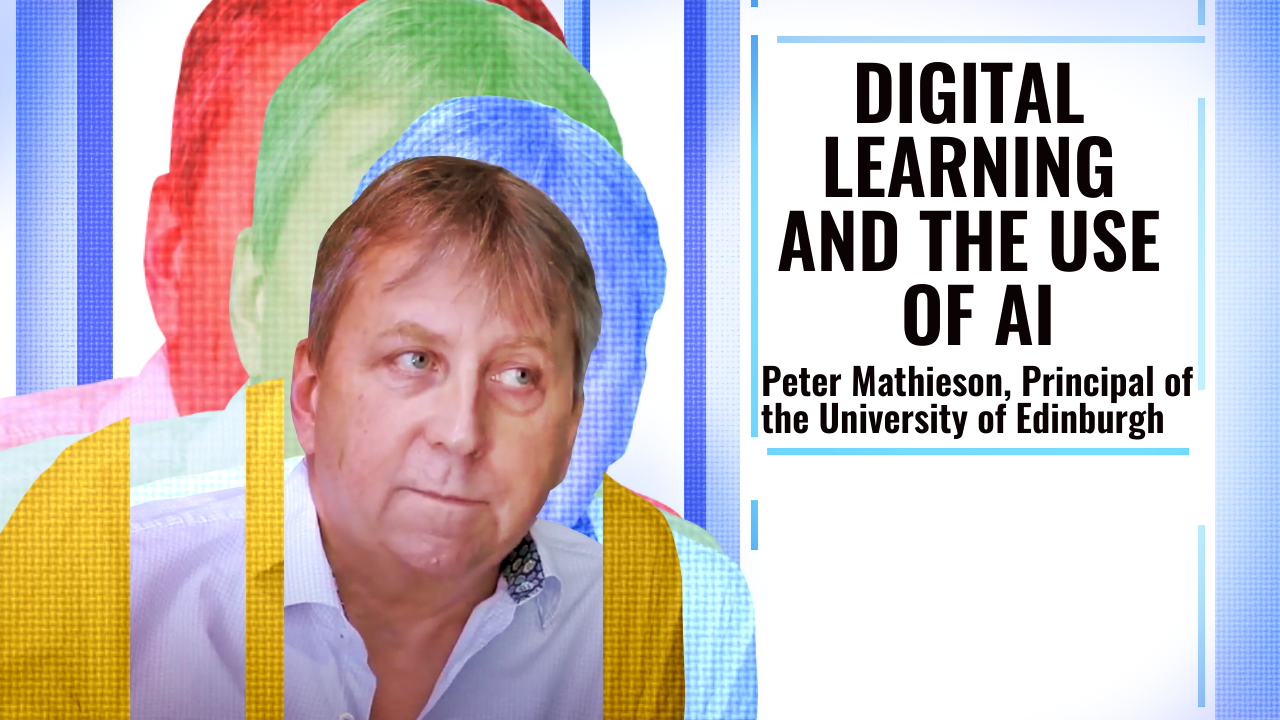Peter Mathieson, Principal of The University of Edinburgh, explains how to prepare faculty for future challenges, and why it is crucial to make sustainable universities.
Transcript
How can universities remain significant to society?
If universities are going to remain as significant to society as they have been, they have to modernize. A lot of this is embracing technology. Edinburgh has been putting a lot of effort into digital education, both internally and externally, and I think we have made a very good start to build on that. I think that is the ability to modernize a very ancient university that has very standard, established, rather traditional ways of doing things. That’s exactly the challenge, that’s what makes it interesting. I think that’s really one of the reasons why I wanted to come to this conference because I need to learn from you (CIIE, 2019).
How do we prepare faculty for future challenges?
So, as you well know, and I know from years of experience, telling academic faculty how to do things or what to do is not a very productive method. It must be a process of engagement rather than a process of almost getting people to believe that this is the right way to plan the future. For example, we’ve put a lot of effort into staff development, so, at the same time, it is developing the technological platforms for online learning, whether this means externally with MOOCs and online courses or internally for on-campus students. Obviously, the technological platform is very important, and we’ve worked hard to develop that, but as well as that, we have to provide staff development, we have to provide education in methodologies, what works well, what doesn’t work well, encouraging innovation and a focus as much on the people as in the technology, seems to us to be the right approach.
Running a university basically is a people-management job. There’s a little money-management as well, but it’s basically managing people, and people respond well to anything which makes them interested, gets them excited, allows them to think that we’re trying to make their job easier or more interesting, rather than – they don’t respond well to anything that seems like it’s going to make their lives more complicated or that they’re going to have more hurdles to jump over. I think it’s that sense of facilitating technological developments, which is really important, and I think the other thing, this comes back a bit, different focus on people in the strategy 2030: the generation that really knows technology and really understands it and knows how to use it, it is not me, it’s actually my students, and I think these young people have grown up with their lives in a way that, when I was a kid I didn’t.To understand the way that they want to receive their information, the way they want to receive their education, is no substitute, in my opinion, from talking to them and listening to the younger generations. Engaging with students, engaging with the younger staff and the technological experts seems to me the right way to develop a future.
Digital learning in universities
Edinburgh was an early adopter of MOOCs. That was before I arrived. We have 2.7 million people enrolled in our MOOCs. So, we have a very large MOOC population, if you like, and I think the same is true for the University of Hong Kong, where I was before I moved to Edinburgh; we also had very early MOOCs. So, that was the first large-scale example of online education, and at the time people would predict that this meant the end of the university as we know it, and this was going to replace universities.
The population that undertakes MOOCs is different from the population that undertakes university education. They’re older, making people return to education or taking up education for the first time. So, I think MOOCS are an addition to universities rather than a replacement for them. Still, then what’s happened, I think, in the time since the MOOC revolution is that people have started to think “well, actually, online education is about far more than MOOCs,” it’s about much more.
I like these micro-masters, we just launched the UK’s first micro-masters in collaboration with edX. Another speaker of the conference worked with both in Hong Kong and the UK, and I’m very proud of the fact that Adam says that he believes the University in Edinburgh is the best university outside North America for online education, so we’re very proud of that accolade, and we have to work out to keep that up because now the competition is very fierce. Everybody is now looking to see how they can develop online education. Still, in collaboration with our colleagues at edX, we’ve launched the micro-masters, which is predictive analytics in the business school, and we have two more micro-masters ready to launch. So, we think that’s a model that will be very effective, so you can gather some people that may later go and do a formal masters or they may not, but whatever, they get some credentials for the micro-masters. I think, most exciting of all, is the way that we’re trying to think about using digital education for our regular, on-campus students. For example, we now recall all of our lectures and students like that. They like the ability to access the lectures outside the actual time-table lecture time. When learning, it’s very interesting learning analytics; they recorded us. They don’t sit down and listen to the whole lecture again, all they do is they scan to find a particular piece that they want to get clarified or a particular section to – the average use of those lectures are quite short. When I first saw that data, I thought that suggested that we were not making something that was very interesting or informative, but I’m told by people that know more about this than me that that is wrong. That’s precisely the way that you would predict young people would use that to recalling, because that’s the way they’re used to access information, in small bites.
So, there are some examples there, and I think the other thing that I think we feel we’ve done well, and I’ve mentioned this before, is the aspect of staff development, we have this slope, and every teacher should be a digital teacher. So we have, at the moment, only a subset of faculty that really actively embrace digital learning, and we have many more that don’t. It’s either because they don’t have the technological ability or they haven’t ever been exposed to the excitement that can be digital learning, or they feel somehow rather suspicious or somewhat uncertain about it. So, we think, providing staff development, so every teacher that’s providing online learning has had some education and qualifications for themselves, we think that’s also very important, we’re not just educating the students, but we’re educating the staff as well.
Ethics and the use of AI
So, it’s absolutely right, I heard a fabulous example recently, which I’ll, I was – there was a conference in Edinburgh called The Spanish Tertulias, I don’t know what tertulias were, but it basically means the convening of minds for discussion of a relevant topic. At this meeting, there was a lot of discussion about artificial intelligence, and one of the overseas delegates related an anecdote, which I thought it was really instructive, he said that there was a, you know Amazon, if you buy a product when
you get to the bottom of the page, it says “you may also be interested in the following”, “previous people that bought this also bought this”, and apparently, that linkage is done by artificial intelligence, so no humans are involved, this is just pattern recognition, and the example was that someone had bought a set of pétanque, the metal boule that French people play to play boule in the street, in the Times Squares, and someone bought a set of these metal boule and the bottom of the page, when it suggested what else this person might wish to buy, the items that came out were a yellow vest, a gilet jaune, and a gas mask. So, the suggestion was that someone who had bought boules and was also buying a yellow vest and a gas mask, and of course this is a reputational concern for Amazon, is their priority what Amazon did in response to that, was re-introduce a human being to sense-check that kind of associations.
You can’t just make it automatic, someone has to sense-check it, and I find that quite reassuring that there’s still a role for human beings. You can’t always make these linkages without somebody, a human saying: “does this make sense?” or “does this have any reputational consequences?” So, there’s an example of lack of, wherever, there’s a bit of regulation, or a little bit of human intervention that makes artificial intelligence more effective.
Sustainable universities
So, there are many challenges, but we, you’re right, we do believe that this can’t just be words, this has got to be actions, we’ve got to be able to measure and demonstrate our commitment. So, we’re rapidly trying to convert all of our vehicles to electric vehicles, we have a lot of, a fleet of vehicles that are involved in the university, we’re converting those into electric vehicles, so I know there are arguments about the sustainability of electric vehicles. Still, we generally feel that’s the right thing to do. All of our new buildings are built according to sustainable principles, so, we know, we’re trying to have multiple forms of heating and energy generation, but we have to be realistic: firstly, the university has 550 buildings across Edinburgh, and many of them are old, and so, many of them are not environmentally friendly. We have to modernize to the extent that we can, but we have to accept that some of those buildings will be much more of a challenge in terms of sustainability.
And the other thing, which I’ve tried to articulate in the time I’ve been there, I think the realistic assessment of a position in terms of climate sustainability has to include recognition that if we want to be researchers in terms of university. We want to have international credentials; then we are going to generate a carbon footprint, it’s unavoidable. 43% of our students are from outside the UK, and so, a lot of those students travel, and they travel home. Hence, there’s a lot of air traveling involved, we have our researchers traveling around the world, talking in conferences, and interacting with other researchers. Then we have some activities, we’ve got the UK’s super computer-based in Edinburgh, and that generates an enormous carbon footprint. We can’t hide from the fact that we’re going to generate a carbon footprint.
We have to take every step we can to minimize that, things, you know, on top of things we’ve talked about, but also to offset and genuinely offset our carbon footprint in other ways. We’re interested in planting trees, in regenerating pip box, in Scotland. Scotland has a very large rural area where we can genuinely produce carbon offsets; this is not a question of buying carbon offsets from some other source, this is about planting new trees and regenerating pip box. We’re contributing to carbon offset nationally, and I think that combination, doing the things that we can to reduce our carbon footprint but also recognizing that the reality of our activities is that we do generate carbon footprint, which we need to measure an offset. That’s the basis of our strategy, with that paired several approaches we think we can deliver carbon neutrality by 2040, that’s our pledge.
This article from Observatory of the Institute for the Future of Education may be shared under the terms of the license CC BY-NC-SA 4.0 
)
)


)